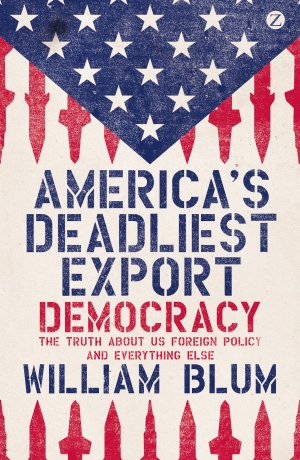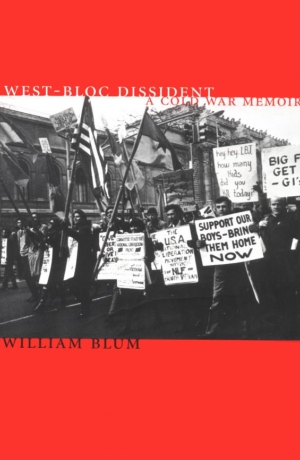Will humans ever fly? Smashing socialism in the 20th century.
By William Blum
This essay was part of a longer paper which appeared in Peace Review: A Transnational Quarterly (San Francisco), March 1997
Imagine that the Wright brothers’ first experiments with flying machines all failed because the automobile interests sabotaged each and every test flight. And then the good and god-fearing folk of the world looked upon this, took notice of the consequences, nodded their collective heads wisely, and intoned solemnly: Humans shall never fly.
Fact: Virtually every socialist experiment of any significance in the twentieth century has been either overthrown, invaded, or bombed … corrupted, perverted, or subverted … sanctioned, embargoed, or destabilized … or otherwise had life made impossible for it, by the United States. Not one of these socialist governments or movements – from the Russian Revolution to Fidel Castro in Cuba, from Communist China to the Sandinistas in Nicaragua – not one was permitted to rise or fall solely on its own merits; not one was left secure enough to drop its guard against the all-powerful enemy abroad and freely and fully relax control at home.
It has become commonplace amongst politicians, economists, industrialists and media that the answer to the question – Is socialism dead? – is not only “yes”, but is self evidently so. They seem to accept a priori the curious equation that if the Soviet Union is dead, so must socialism be dead, if not all things progressive. And many on the left seem to be buying into this oddity. This equation not only ignores the past described above, but ignores the present reality as well, for since “the end of communism/socialism”, communists and socialists have been elected to the highest offices in the land and/or won control of parliament in more than 20 countries, including many in the former Soviet Union and its Eastern European bloc. Consider the following sample:
Hungary
In May 1994, four years after being voted into near oblivion, Hungary’s former Communists swept back into power. Under their new name of the Socialist Party, they won 209 seats in the 386-seat parliament. “The strong showing of the Socialists,” said the New York Times, “was attributed to widespread discontent with Hungary’s first efforts at a market economy.” 1
Poland
In September 1993, the Democratic Left Alliance (DLA) – composed of the former Communist Party and other socialist groups – won the parliamentary election and formed a new government.
In March 1995, former Communist Party official Josef Olesky became the Prime Minister.
In November of the same year, Aleksander Kwasniewski of the DLA, and a former minister in the Communist regime, defeated Lech Walesa for the presidency.
Bulgaria
In June 1990, the former Communist Party, renamed the Bulgarian Socialist Party, won control of Parliament and filled the offices of president and prime minister. Before the year was over, the BSP was ousted in what amounted to a coup, engineered and financed by the CIA front, the National Endowment for Democracy. 2 The party then won re-election in December 1994, with a former Communist Party official becoming prime-minister.
Albania
March 1991, a Communist government won national elections overwhelmingly, but, as in Bulgaria, a general strike and widespread unrest, financed again by the National Endowment for Democracy, brought on the government’s collapse. 3
The current ruling party, the anti-communist Democratic Party, stays in power and keeps the Socialist Party (the former Communists) out only through elections so fraudulent that even the Clinton administration has been obliged to express its regrets about the “numerous irregularities” which “marred these elections”. 4
Italy
In April 1996, a Left-Center coalition, composed of the Democratic Party of the Left (the former Communist Party) and the Communist Refoundation Party, won a majority of seats in both houses of parliament. The Democratic Party of the Left holds the majority of cabinet seats as well.
Romania
Ion Iliescu, a former Communist who led Romania since the fall of dictator Nicolae Ceausescu, to whom he was a close adviser, has won election to the presidency continuously since 1990.
Slovakia
Vladimir Meciar is the Prime Minister and the head of the Movement for a Democratic Slovakia, the main party in the ruling coalition. His party won power in 1994 on a strong anti-capitalist platform, winning 34% of the vote, more than three times that of the second place party.
Lithuania
Algirdas-Mykolas Brazauskas, former First Secretary of the Central Committee of the Lithuanian Communist Party, was elected President in February 1993. His party, the Lithuanian Democratic Labor Party, the successor to the Communist Party, has won a majority of seats in the parliament.
Czech Republic
The left-wing Czech Social Democratic Party came in a close second in parliamentary elections held May 31/June 1, 1996. The ruling conservatives need the support of the Social Democrats to govern. The parliament elected the leader of the Social Democrats as its new chairman.
Portugal
In October 1995, The Socialist Party won the general election. The following January, the SP candidate, Jorge Sampaio, won election as President – the first time both the government and the president have been of the same political party since democracy was restored in 1974.
Tajikistan
In November 1994, Imomali Rakhmonov, former Communist, was elected president and is still in office.
Estonia
In March 1995, the voters decisively ousted the pro-market ruling coalition in favor of a coalition advocating greater commitment to social protection and vowing to rein in “cowboy capitalism”. This coalition is still in power, but it has not abided by the voters’ mandate, ruling more from a center-right perspective.
Russia
Despite numerous highly questionable practices of Boris Yeltsin and his media (plus the best efforts of the United States), the Russian Communist Party, during the period of 1994-96, was the largest single bloc in the lower chamber of parliament. One of its members was the speaker. Former Soviet Communist Party Politburo member, Yegor Stroyer, was chosen chairman of the upper house of parliament. The party’s leader, Gennady Zyuganov, came in a close second in national elections in 1996.
Cyprus
In May 1996 parliamentary elections, the Communist Party won 33 percent of the vote, coming in second to the 34.5 percent won by the governing center-right coalition.
Sri Lanka
August 1994: A Socialist alliance (People’s Alliance Party) was the top vote getter in parliamentary elections.
India
A coalition, variously described as leftist and center-left, came to power in May 1996 elections. Leading Communist Party officials were picked to head the powerful Home Ministry and the Agriculture Ministry, the first Communists to be part of an Indian government since independence in 1947.
Nepal
In November 1994, the King appointed as Prime Minister, Man Mohan Adhikary of the Communist Party of Nepal-United Marxist-Leninist, after the party won a plurality of seats.
Ecuador
In July 1996, a populist candidate, with strong support among the poor and disenfranchised, Abdala Bucaram, won the presidency with some 54 percent of the vote. [His regime turned out to be not progressive at all.]
Iceland
In June 1996, left-wing politician Olafur Ragnar Grimsson was elected president with 41 percent of the vote, to his right-wing opponent’s 29 percent.
Postscript
The electoral trend described above in the former Soviet republics and Eastern European satellites, reflecting broad dissatisfaction with the newly-introduced capitalist way of life, was not permitted by the United States to blossom into progressive social change or simply to go where it might go. Washington intervened in these countries in the many ways Washington is expertly practiced at.
Notes
- New York Times, May 30, 1994
- William Blum, Killing Hope: US Military and CIA Interventions Since World War II, chapter 51
- Ibid.
- Christian Science Monitor, June 10, 1996




